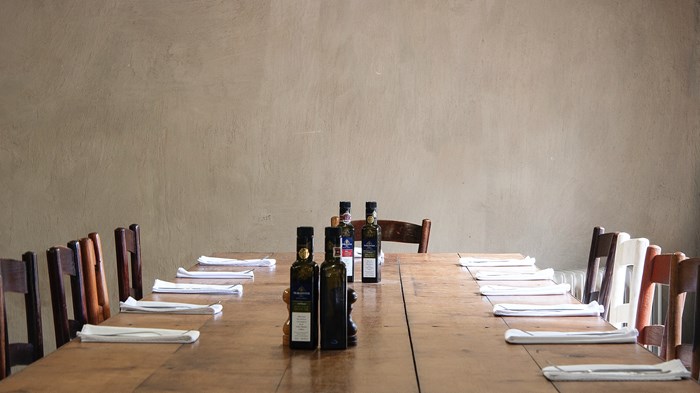Jesus, the Most Embarrassing Dinner Guest in the Four Gospels

Do you have that person in your life that you sort of have to apologize for?
What I mean is, maybe there’s a family reunion or a wedding, and you find yourself warning your children or the other guests, “Look my great uncle Joe will be there...and he’s going to do some things...and worse, he’s going to say some things. So I just need to apologize in advance, on his behalf.”
I sometimes feel like Jesus is that great uncle. He’s constantly saying things that ought not to be uttered in polite society. Yet I love him for it. Jesus is unafraid to speak truth to power, to ruffle feathers.
In Luke 14, we find precisely one of those feather-ruffling, great-uncle-Joe moments.
Jesus was invited to a prominent Pharisees’ home for a dinner party, and he sits back and watches all of the dinner guests scramble for the best seat in the house. That is, until he decides to interrupt the ridiculous power-grabbing scene by saying this:
“When someone invites you to a wedding feast, do not take the place of honor, for a person more distinguished than you may have been invited. If so, the host who invited both of you will come and say to you, ‘Give this person your seat.’ Then, humiliated, you will have to take the least important place.
“But when you are invited, take the lowest place, so that when you host comes, he will say to you, ‘Friend, move up to a better place.’ Then you will be honored in the presence of all the other guests.”
In this day and age, with so many church leaders and ministers choosing prominence, prestige, platform, and power over service and Christlike humility, this passage gives us some powerful words of wisdom to consider:
God wants you to surrender our dogged pursuit of “The Good Seat.”
Where is your “seat of honor?” What is that position, that admiration, that approval, or that “place” you desperately want? To what end are you hustling and striving? What table are you elbowing your way to get invited to? When do you manipulate your social media or status to impress? What promotion or position are you desperate for, relentlessly dreaming about? When you think about it—what “seat of honor” makes you bitter, envious, angry at God, because you cannot seem to land it?
What Jesus is saying to the Pharisees, and to us, especially in our strive-and-hustle-check-all-of- the-correct-boxes-culture is simple: check yourself before you wreck yourself. In other words, give up your dogged pursuit of good seat.
God invites us to do something radically different than claw our way to the good seats in the house. We are invited into a kingdom, a way, that values rest instead of restlessness, surrender instead of strife, and trust instead of hustle.
But the question is why—why does it matter to God that we take the lowest seat at the table? Why does it matter to God that we give up our pursuit of the “good seats”?
God is inviting us to give up the good seats—not as a form of punishment—but because he cares about our souls, and the souls of those we influence. God knows that humanity’s endless pursuit of the “seat of honor” will only haunt us and those we love, leading to destruction for generations. As Jesus asks in Mark 8: 36, “What good is it to gain the whole world but lose your soul?”
Because of Jesus’s work on the cross and at his resurrection, when we come into a relationship with Jesus, we are clothed in his righteousness, made new in him. Therefore, we don’t have to fight for the good seats, because we are already accepted in the greatest seat of all - the throne room of God.
God wants your humility, not your humiliation.
We might hear this word, “Don’t take the good seat; humble yourself,” and assume a false idea about God. We may believe that God wants to put us under his thumb and keep us small and groveling before him.
But look again at what Jesus is saying: “When you’re invited, take the lowest place, so that when your host comes, he can say to you, “Friend, move up to a better place. Then you will be honored in the presence of all the other guests” (Luke 7:10).
This passage is actually about our honor, not our humiliation. It’s about Christlikeness being formed in us, so that we can serve God’s kingdom and influence others for Jesus’s name.
Jesus is saying, “Look. I don’t want you to be humiliated. I want you to be honored, but in the right way. In God’s way. In God’s timing. Through God’s provision - not through your own striving or pride. That way, when God promotes and uplifts you, it’s for his glory, not your own.”
God wants you to invite the uninvited.
After addressing the entire dinner party, Jesus turns to the host and ruffles some more feathers by speaking pointedly, “When you give a luncheon or dinner, do not invite your friends, your brothers or sisters, your relatives, or rich neighbors; if you do, they may invite you back and so you will be repaid. But when you give a banquet, invite the poor, the crippled, the lame and the blind, and you will be blessed. Although they cannot repay you, you will be repaid at the resurrection of the righteous.” (Luke 14:12-14)
Jesus is saying, “You invited the wrong people to this meal. You invited who will pay you back, those whom you can get something from. But you need to go out into the streets and invite the people who cannot give you anything in return. You should have invited the wounded, the weary, the weak.”
In other words, “You should have invited those who feel uninvited. That’s the kind of invitation God blesses.”
In our divided day, we have to be mindful of this pharisaical tendency inside us. Who in our lives have we put up a wall against? To whom have we subconsciously said, I am holier than you, therefore I am going to keep my distance? Or, my echo chamber is better than your echo chamber, so we cannot commune together. Or because I can’t network with or schmooze you, you are not worth my time.
Who feels uninvited to God’s table because of you? Is it family member, a friend, a neighbor, a people group?
When we begin to recognize that divisive, holier than thou tendency within us—it is an invitation to ask God to re-gospel us. We must invite the Spirit of God to remind us what great a salvation we have received in Jesus – who, while we were still sinners, still unwelcome, still had no seat at the table, died for us. God did not separate himself from us when we were covered in our sin and shame but drew near and invited us in. May we be the kind of people who are humble us enough to do the same for others, as out outflow of our worship.
Ultimately, what will impact the world for God’s Kingdom will not be grandiose gatherings, or great connections, or tables filled with gifted leaders. Rather, it will be the small, faithful lives of Christ-followers, who have chosen humility for the sake of our gospel-witness, and who have welcomed the “unwelcome” in Jesus’s name.
Aubrey Sampson, M.A. Evangelism and Leadership, is the author of three books including The Louder Song: Listening for Hope in the Midst of Lament and her latest, Known: How Believing Who God Says You Are Changes Everything. She co-planted Renewal Church in West Chicago, and is the cohost of The Common Good radio show and the Nothing is Wasted podcast. Aubrey is passionate about hope for the hurting Christian.
The Better Samaritan is a part of CT's
Blog Forum. Support the work of CT.
Subscribe and get one year free.
The views of the blogger do not necessarily reflect those of Christianity Today.






















